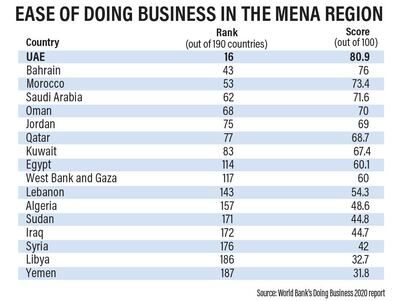Four Arab countries were among the top 10 improvers in the World Bank's Doing Business 2020 report as the economies of the Middle East and North Africa made more reforms than ever.
Saudi Arabia was the world’s most improved in the annual ranking of the “ease of doing business” in 190 countries. It climbed to 62nd place, from 92nd last year. The kingdom, together with Jordan, Bahrain and Kuwait accounted for almost half of the reforms made in the region.
The UAE, in 16th place with an ease of doing business score of 80.9 out of 100, remained the strongest performer overall in the region.
“It is a year of records for economies in the Middle East and North Africa, and we are committed to continuing our support to all countries in the region,” said Ferid Belhaj, World Bank regional vice president for the Middle East and North Africa.
Regional economies put 57 business regulatory reforms in place in the 12 months to May 1, up from 43 during the previous 12-month period covered by the study. Thirteen of the region’s 20 economies carried out reforms and the average ease of doing business score improved by 1.8.
The Gulf led the way with 35 measures to improve the business climate, as GCC countries undergo reforms to boost the economy and encourage foreign investment. As part of Saudi Arabia Vision 2030, the country has opened up to tourism, removed the ban on women driving and invested in large infrastructure projects. Other landmark reforms include new bankruptcy laws in Saudi Arabia and Bahrain.
The Doing Business report, which began in 2003, covers regulations affecting 10 areas of the life of a business including starting a business, dealing with construction permits, connecting electricity, registering property, securing credit, protecting minority investors, paying taxes, trading across borders, enforcing contracts and resolving insolvency.
The top five countries in the study were identical to 2019 with New Zealand in first place at a score of 86.8, followed by Singapore, Hong Kong, Denmark and South Korea. The US moved up from eighth place in last year’s report to sixth place and the UK moved up slightly from ninth to eighth.
The top 10 improvers were Saudi Arabia, Jordan, Togo, Bahrain, Tajikistan, Pakistan, Kuwait, China, India and Nigeria.
Saudi Arabia increased its doing business score to 71.6 from 63.5 in the 2020 report, making it the world’s top improver. It carried out a record eight reforms between May 2018 and May of this year.
The kingdom strengthened access to credit by introducing a secured transactions law and an insolvency law. It also established a one-stop shop for company incorporation and eliminated the requirement for married women to provide additional documentation when applying for a national identity card. Other developments include an online platform for certification of imported goods and an upgrade in infrastructure at Jeddah Port.
“Saudi Arabia’s impressive reforms in doing business this year show its commitment to fulfilling a main pillar of its National Vision 2030: a thriving economy,” said Issam Abousleiman, World Bank regional director of the Gulf Cooperation Council.
“Easing the business climate for local entrepreneurs to thrive as well as foreign investors to work in the kingdom shows a forward path to creating more jobs for Saudi youth and women, and creating sustainable, inclusive growth.”
Jordan moved to 75th place from 104th with notable measures including strengthening access to credit by introducing a new secured transactions law and amending its insolvency law.
Bahrain, with nine reforms, led both the region and the world in number of reforms implemented. It climbed to 43rd place from 62nd and improved its doing business score to 76, from 69.85. In addition to introducing a new bankruptcy law, the country recently strengthened the rights of minority shareholders and made the process of obtaining building permits easier through a new online platform.
Kuwait implemented seven reforms and moved to 83rd place from 97th. It streamlined several business processes, such as a new electronic clearance system for trade across borders.
The UAE also strengthened the rights of minority investors, streamlined business registration processes and made it easier for businesses to import and export goods.
“The next generation of reforms should focus on transparency, fair competition and good governance to make Mena open for business and attract investments needed to create jobs for youth and women,” Mr Belhaj said.



